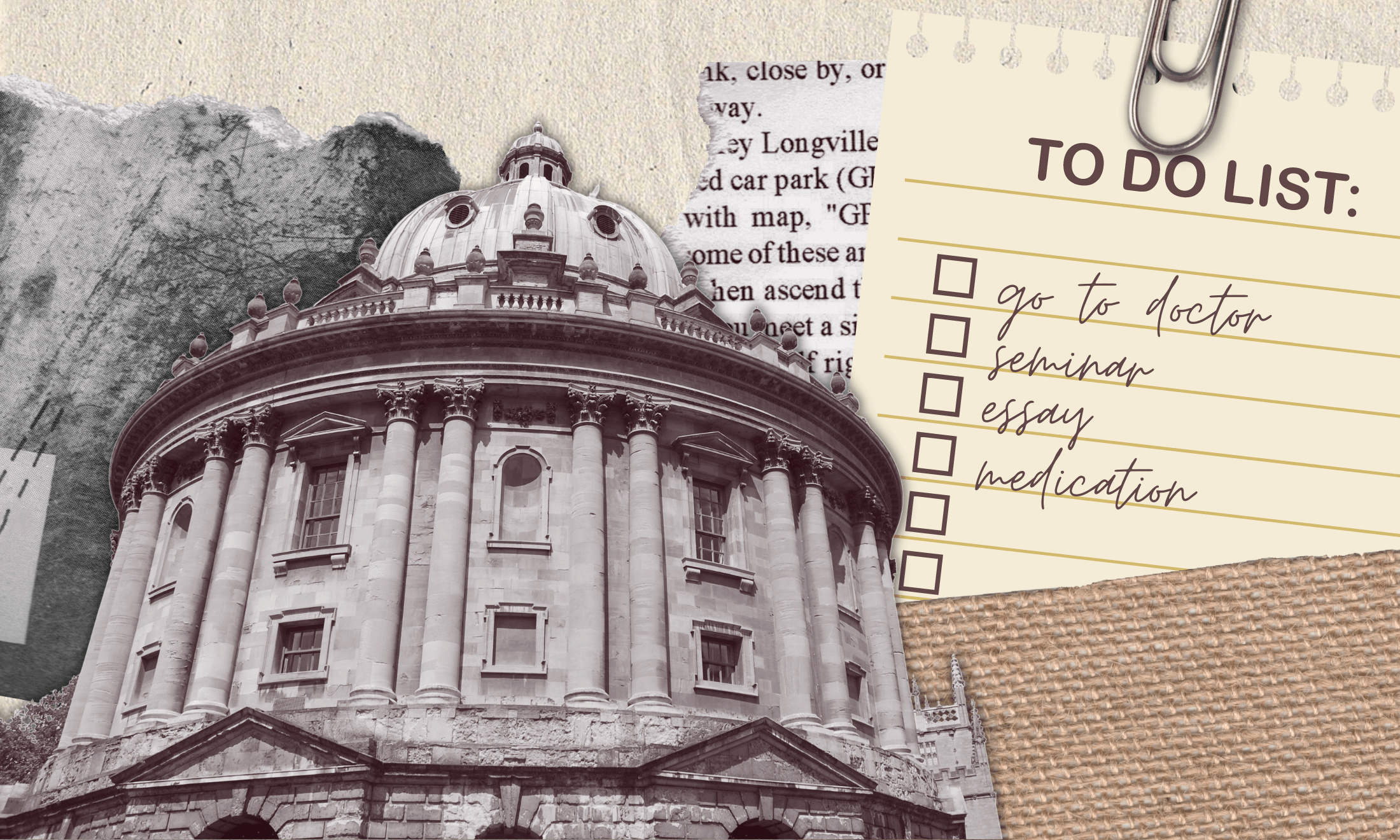
Canva
Productivity culture at Oxford uni, my chronic illness and me
What it’s like having epilepsy at a high-pressure university.
Megan Baffoe and Editors
03 Feb 2022
I find that people who are generally healthy don’t get the concept of chronic illness. They either decline to wrap their heads around the fact that my epilepsy exists or ask me what on earth I’m doing at The University of Oxford. The latter reaction is only more likely if I reveal that the biggest triggers for my seizures and jerks are stress and tiredness.
And – to an extent – I get it. Since my first epileptic seizure in 2017 was a surprise, I essentially exist as a living reminder that our health isn’t ever wholly under our control. Many people, I’ve come to realise, cling onto the illusion that it is. It’s a safety blanket; the alternative (which, in my case, was waking up in a hospital bed and being informed that I had suddenly and randomly had a seizure in a taxi) is frightening. But when it does happen, you quickly comprehend that your best option is to not give in to the fear. You have to put idealistic understandings of fairness and fitness aside and reconcile with reality.
And so, I did. I listened to the doctors. I took my medicine. Living with the restrictions was frustrating, especially for a 15-year-old. The ones I vividly remember were not being allowed to lock the bathroom door, only being allowed one cup of caffeinated tea a day and the restrictions on my screen time. The latter made it difficult to keep up with my schoolwork. It lasted for about a year, perhaps a little longer. By the time I was in sixth form college, I had become far more functional. Functional enough to apply to Oxford.
“I essentially exist as a living reminder that our health isn’t ever wholly under our control”
I had no worries about the grade requirements, and all the extra work involved with an Oxbridge application seemed manageable. My reasons for applying – career prospects, the collegiate system, the standard of education – were all pretty standard and didn’t factor in my epilepsy as much as people tend to presume. The University of Oxford tells applicants to prepare for a high-intensity, stressful environment, and my first year certainly delivered. But, as I found out in my last term, the second year step-up is no myth and I struggled.
The second half of 2021 was the first time in a long time that the pain in my muscles became genuinely unmanageable. There were a couple of weeks where I simply wasn’t leaving my accommodation for days at a time, getting my work done when my painkillers were most effective. Fortunately, I could get through to the GP, but Oxbridge terms are so fast-paced that even a day off can knock you back. I’m somehow still catching up; I can’t even imagine how much work I’d have piled up if not for Teams calls, as you can’t spend an in-person tutorial lying flat on a hot water bottle.
“I’m working on remembering that ‘doing okay academically’ is not the same thing as ‘doing okay’”
My absence seizures also became a problem this term; in a way they haven’t been since my secondary school days: absences, which are the most common form of seizure, aren’t what you’re probably picturing. They essentially just amount to a lapse in awareness or my brain shutting off for a very short period. Academically, they can be very irritating; it means that I miss questions, and there are only so many times you can say “sorry, I didn’t catch that” before you feel embarrassed. In my very last week of term, it became nigh impossible to write my essay; I was forgetting thoughts as soon as I had them, with not even enough time to get them down on paper. My flatmates are now used to redirecting the conversation because I can’t remember what I meant to say.
It feels crucial to stress that I’m not, in any way, unable to produce work of a good standard, as I hate it when I get the sense that someone doubts my capability. All the marks I’ve received for my essays have been absolutely fine and my reports were good despite my chronic illness. But, just as important – and I’m working on remembering this – is the fact that ‘doing okay academically’ is not the same thing as ‘doing okay’.
“No amount of denial or ‘mind over matter’ will make epilepsy go away”
When operating in a high-pressure environment, it can be quite easy to internalise some of the regressive attitudes surrounding productivity. Although my college has a sound support system – between the in-house nurse, counsellor, my personal tutor and the Disability Advisory Service – a lot of the work culture at Oxford isn’t sustainable for the average person, let alone those of us who are disabled or neurodivergent.
I believe that that kind of cultural change has to come from the top; the structures are in place to help students when they’re down, but preventative measures could stop many from getting to that point. Everyone at our univeristy knows about ‘the fifth-week blues’ – a phenomenon where, during week five of the eight-week term, vast numbers of students hit a mental breaking point. During this week, fluffy animals are hired, doughnuts are given out, and countless ‘welfare workshops’ are put on to uplift our spirits. And – although I enjoyed all the cakeand the puppies were adorable – I wish that the university did more to try and prevent students from burning out.
It’s really easy to forget how much basic upkeep your body needs – you have to make a conscious effort to take your meds, get a decent night’s sleep and eat well in an environment where deprioritising such basic upkeep is normalised. Even writing this – which is essentially just an accurate description of my experiences – feels wrong, somehow; societally, we are infatuated with the idea that ‘negativity’ – even when negativity is as simple as “I’m not well/healthy enough to do that” – should be suppressed. But the reality is, you can’t really ‘positive mental attitude’ yourself from sickness.
“You can’t really ‘positive mental attitude’ yourself from sickness”
I thought I understood the dangers of toxic productivity culture, but this last term at Oxford, my conviction took on an all-new meaning. Physically exhausted and in near-constant pain, my brain found itself so much more easily overwhelmed than it was usually; brushing my hair, or carrying a book from my room to the kitchen, could give me stabbing pains in my arm for the rest of the day. Taking a shower was so exhausting that I’d end up needing a nap immediately afterwards. There was no denying that something was wrong, and I’m not sure I would have made it to the end of the term if I had pretended that nothing was. So, I didn’t.
Instead, I got in contact with my GP and with my tutors. I have more catch-ups than most of my classmates to do in the holiday, but I’m making sure to keep in mind that I need a lot more rest, too.
Now I’m back home and feeling slightly more stable, I’ve had some time to reflect. I’m proud of myself for the times I chose to prioritise my health over my work. Although it’s not the only reason to think about my health, I believe it is significant to note that driving myself any further would have had a far more damning impact on this academic year. When you’re epileptic, a ‘breaking point’ is not a place you want to go; I’m proud that I’ve learned to identify where the brink is, and that I’m firmly acquainted with my own limits. No amount of denial or ‘mind over matter’ will make epilepsy go away, and I’m not sure if I would have been able to get through some of the most challenging moments if I thought it could.









